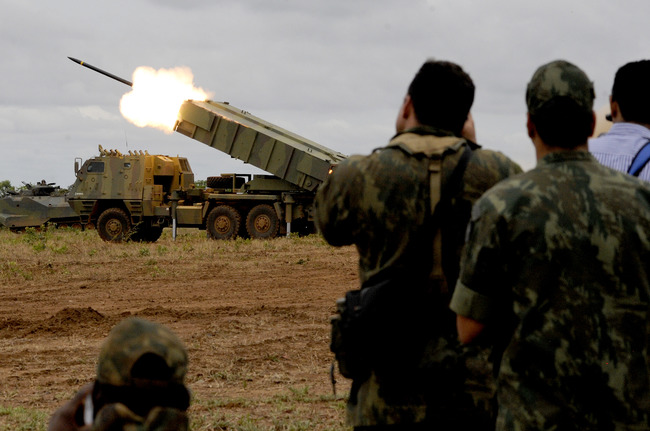
By Rafaela Céo
With an amphibious operation simulating the capture of a beach head on a hostile coast, the Brazilian Navy concluded Operation Formosa. The event, which concluded a year of training for the country’s Marines, brought together 1,900 troops in the state of Goiás.
This final round of training consisted of four stages: troop deployment from Rio de Janeiro to Brasília; workshops, where battalions were grouped by specific areas; tactics, consisting of a simulation of a crisis situation; and finally, the demonstration stage.
In addition to the use of airplanes, such as fighter jets, anti-aircraft guns and armored troop transport vehicles, the simulation highlighted the Astros CFN 2020 Multiple Launch Rocket System and the SABER M60 radar, which can simultaneously detect and identify several targets in a radius of up to 60 km. Both the Astros system and the SABER radar are manufactured domestically and were acquired by the Navy in 2013.
“Our multiple rocket launcher is a weapon that effectively upgrades the Fleet Marine Force,” said Fleet Marine Force Commander Vice Admiral Washington Gomes da Luz Filho.
The training is conducted with real and essential ammunition so that the Fleet Marine Force can maintain its principle characteristic: being a rapid-deployment expeditionary force.
“There is only one way for the troops to be considered ready. It’s not only by training; it’s by training with real ammunition. It does us no good to train in places where we cannot fire live ammunition.”
‘Indispensible’
The Formosa training camp, located 1,600 km from Rio de Janeiro and 80 km from Brasília, belongs to the Army and has been used by the Navy for the past 25 years. During the last seven years, the training has included all operational areas of the Marine Corps, with weapons and manpower.
Though the camp lacks a sea, which can make it difficult to simulate amphibious actions, its features more than compensates for this: the facilities provide housing, with tents, water, and sewage treatment located very close to the training site. And the camp itself is enormous, covering 1352 square kilometers.
“This area is the only place where we have the necessary conditions to land two thousand Marines – that is, an amphibious brigade – and in addition be able to use under realistic conditions each weapon in the Marine Corps arsenal, from the 556 rifle, which is an individual weapon for amphibious combat, to the Astros rocket launch system, which can hit a target up to 80 km away,” said Vice Admiral Washington Gomes da Luz Filho.
To move Marines and weapon securely, three logistical support details were set up. As the vehicles arrive at the support posts, vehicle maintenance is performed while the travelers rest. The transfer began on October 3 and ended on October 17.
This is when the risk of accidents is the highest: not during the exercises, but during the troop transfer. However, for the past few years, the accident rate is close to zero.
Actions
Since April, 400 Marines have participated in the Garantia da Lei e da Ordem [Protecting Law and Order] mission at Complexo da Maré in Rio de Janeiro. Additionally, about 200 Marines are still serving as a peacekeeping force in Haiti; and since 2011, 20 participate in peacekeeping operations in Lebanon.
In 2010, the corps joined a humanitarian operation in Chile after the earthquake. In 2011, when there were massive landslides in the mountainous region of Rio de Janeiro, they took part in humanitarian aid operations in Nova Friburgo.
In São Domingos, Cabo Verde, Marines served as a peacekeeping force, under the aegis of the Organization of American States (OAS). From 1990 to 1992, under the United Nations (UN), the Marines were present in Central America, as military observers to the demobilization of Nicaraguan guerrilla groups.




